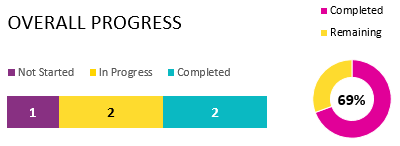Strategic Priority 3
Promote and support deep and engaged learning for all through high-impact practices, educational technologies, and the scholarship of teaching and learning.
Review the following strategic goals and additional work we have done in support of this strategic priority.
Goals:
| Develop a cohort-based faculty development program in research on student learning. | 100% | ||
| Offer a Course Design Institute on designing learner-centred courses. | 80% | ||
| Promote CITL's Learning Technology Index in the selection of educational technologies. | 100% | ||
| Create an Assessment Toolkit to assist in the design of effective assessments. | 35% | ||
| Enable CITL staff engagement in conference presentations and peer-reviewed publications. | 0% |
Our work:
The Writing Centre has enhanced its support for students by offering online synchronous tutoring sessions, in addition to its existing in-person sessions. The online format provides students with greater access and flexibility to participate in sessions without having to be on campus. Undergraduate students can schedule tutor appointments using the Navigate app. Graduate students can schedule appointments by calling (709) 864-3168 or by emailing writing@mun.ca. Read more about the Writing Centre's online tutoring sessions.
In 2022, the inaugural Teaching Innovations and Learning Enhancement (TILE) fund competition launched as an institution-wide opportunity to encourage and support the exploration and inclusion of innovative teaching and learning practices at Memorial University. The fund supports projects in equity, diversity, inclusion and anti-racism; the integration of learning technology with teaching practice; and high impact practices in teaching and learning.
Ten projects received funding from TILE in 2022, and on May 3, 2023, recipients shared their work with the wider university community in a TILE Showcase. A call for applications for the 2023 TILE fund will be coming this spring. Watch the TILE 2023 playlist.
CITL’s Media Services team uses an Insta360 Pro camera to experiment with creating 360-degree virtual tours to be used in teaching. The team produced a series of interactive virtual tours ranging from a simple interactive image to a more complex interactive image with multiple interactive video "hotspots".
Below is a sample 360-degree recording the team created to show the capabilities of the new camera. Click and hold your mouse to drag the screen, or use the arrows on the top left to toggle around the room.
The team introduced this new technology to CITL staff in fall 2022. A series of virtual tours has since been produced for the Centre for Institutional Analysis and Planning (CIAP), and our team is working on a promotional package to introduce the technology more broadly to the university community.
Our learning technology coaches continue to provide support to instructors with using learning tools for instruction, including those in Brightspace and Webex, and other classroom technologies. They also help with exploring other learning technologies that may address an instructional challenge, or create a more accessible and engaging learning experience for students.
The Teaching Skills Enhancement Program (TSEP) for graduate students was revamped in time for the fall 2021 semester to better meet the needs of students and align with Memorial's strategic priorities. Changes to the program include a focus on Indigenization, equity, diversity and inclusion; flexible online content; peer review assignments; and more.
Since fall 2020, CITL has supported efforts to better understand and use the data we receive from our participation in the National Survey on Student Engagement (NSSE). In addition to collaborating on a pan-university committee to interpret and communicate Memorial's 2020 results, in the fall 2021 semester CITL conducted an interactive review session with Deans Council to share what we have learned; the topic of high impact practices was featured as a priority indicator for improvement.
Work is ongoing in our collaboration with faculties, schools, departments and campuses to create new flexible learning spaces, including active learning classrooms, hybrid classrooms and informal learning spaces. In August 2023, our Classroom Technologies team completed three hybrid classrooms in the School of Social Work using advanced technologies such as video conferencing, lecture capture and assistive listening capabilities to better accommodate local and remote participants. In the Faculty of Engineering and Applied Science, CITL completed one active learning classroom with an additional classroom scheduled for completion in the winter of 2023. The room design, flexible furniture, writing surfaces, and technology all combine to support faculty in engaging with their students through collaborative learning activities.
